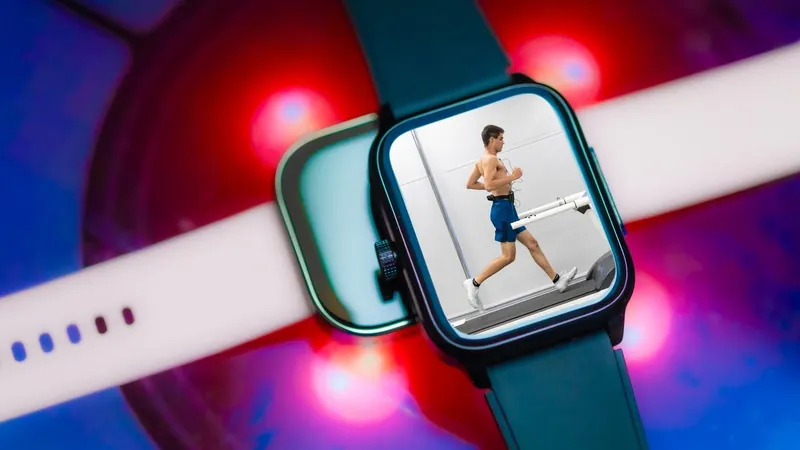
The Rise of Smartwatches: Your Next Personal Health Coach by 2025
2024-12-31
Author: Nur
The Rise of Smartwatches: Your Next Personal Health Coach by 2025
In a striking shift, smartwatches are evolving into advanced personal health coaches, with features that might just revolutionize the way we manage our wellbeing. Imagine asking your smartwatch, "I feel tired despite a good night's sleep. What should I do?" and receiving tailored advice that encourages you to hydrate, stretch, or take a brisk walk. This scenario isn't just a futuristic dream; it's becoming a reality thanks to the latest advancements in wearable technology.
Recently, the Oura ring has made headlines by integrating AI into its app, offering real-time feedback on health metrics such as sleep patterns, heart rate, and more. This level of interaction demonstrates a pivotal change in the smartwatch industry, which is increasingly focused on personalized insights rather than merely presenting data. As companies like Samsung and Google continue to innovate, we can expect wearables to interpret our health metrics more effectively, offering advice that is relevant to our lifestyles.
Ranjit Atwal, a research director at Gartner, emphasizes the importance of continuous health monitoring and early detection. "Personalizing healthcare is where it's all headed," he explains, indicating that future wearables will adapt to the context and needs of individual users. This means that rather than poring over graphs, users could simply ask their device for key insights or summaries of their health data. With tools like Google’s Insight Explorer and Apple Watch’s Siri capabilities, users are already experiencing this evolution firsthand.
The competition among tech giants is heating up. Companies like Apple and Samsung are reportedly developing their own digital health coaches. According to Bloomberg, Apple is exploring a digital health coach integrated with Apple Watch data to offer tailored lifestyle recommendations. With Samsung's tests involving large language models to generate personalized health insights, the market for AI-driven health monitoring is set to expand rapidly.
Smart rings such as the Oura and Zepp lead the charge in health coaching innovation. Canalys research analyst Jack Leathem highlights those devices, indicating that traditional smartwatch manufacturers must catch up. With high-profile players entering the market, the demand for more comprehensive health features will only increase.
Yet, the ambition of integrating AI into health monitoring is not without challenges. One major obstacle is the limited processing power of smartwatches. Currently, effective AI processing often requires cloud support, which delays instantaneous feedback. ABI Research's David McQueen notes, "Due to the nature of generative AI, smartwatches need external support to crunch data effectively."
Looking to the future, while smartwatches will continue to see hardware upgrades and enhanced sensor capabilities, the most remarkable changes will occur in software. Current developments include improved sleep apnea detection using existing sensors and advanced exercises for more personalized health management. However, ambitious features such as non-invasive blood sugar monitoring still remain on the horizon.
As smartwatches aim to provide a holistic approach to health, we’re seeing increased interest in nutrition tracking and personalized dietary recommendations. With partnerships like Oura’s collaboration with Dexcom to enhance metabolic health insights, and Apple's rumored app targeting prediabetics, the importance of nutrition in wearable tech cannot be overstated. Samsung also prioritizes nutrition alongside sleep and activity tracking.
Aiming to make smartwatches more independent devices, tech companies are actively working on improving cellular connectivity. While current devices depend on 4G LTE, the anticipated deployment of 5G could offer greater freedom from smartphones. However, experts warn that until standalone applications justify the costs associated with cellular connectivity, many users might remain skeptical.
As we look to 2025, it’s clear the smartwatch landscape will be transformed. Devices will empower users to take active roles in their health through meaningful interactions rather than passive data collection. Don’t be surprised when the most productive conversation of your day is with your smartwatch, discussing how to improve sleep or curate an exercise regimen.
Ultimately, the future isn't just about tracking; it’s about actionable insights tailored to your health needs. As Ramon T. Llamas, a research director at IDC, puts it, the shift towards smarter health coaching is not just an upgrade—it's a necessity for proactive health management. Are you ready for your smartwatch to become your personal health coach?
 Brasil (PT)
Brasil (PT)
 Canada (EN)
Canada (EN)
 Chile (ES)
Chile (ES)
 Česko (CS)
Česko (CS)
 대한민국 (KO)
대한민국 (KO)
 España (ES)
España (ES)
 France (FR)
France (FR)
 Hong Kong (EN)
Hong Kong (EN)
 Italia (IT)
Italia (IT)
 日本 (JA)
日本 (JA)
 Magyarország (HU)
Magyarország (HU)
 Norge (NO)
Norge (NO)
 Polska (PL)
Polska (PL)
 Schweiz (DE)
Schweiz (DE)
 Singapore (EN)
Singapore (EN)
 Sverige (SV)
Sverige (SV)
 Suomi (FI)
Suomi (FI)
 Türkiye (TR)
Türkiye (TR)
 الإمارات العربية المتحدة (AR)
الإمارات العربية المتحدة (AR)